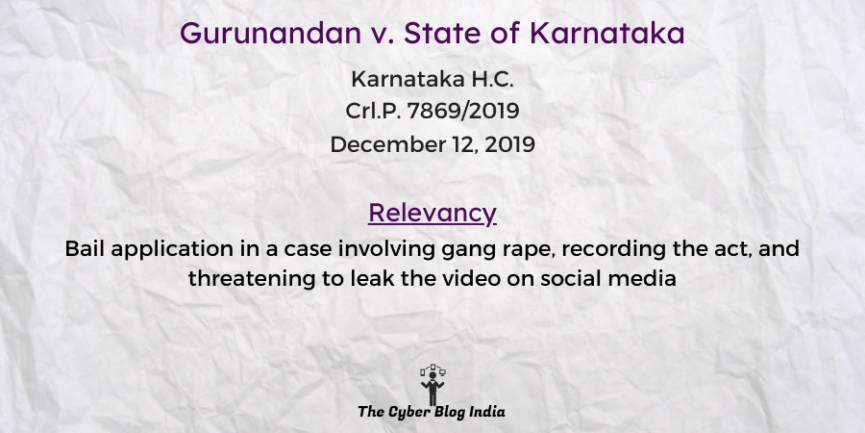Gurunandan v. State of Karnataka

Gurunandan v. State of Karnataka
In the High Court of Karnataka
Crl.P. 7869/2019
Before Justice K.N. Phaneendra
Decided on December 12, 2019
Relevancy of the case: Bail application in a case involving gang rape, recording the act, and threatening to leak the video on social media
Statutes and Provisions Involved
- The Information Technology Act, 2000 (Section 66E, 67A)
- The Indian Penal Code, 1860 (Section 341, 376D, 506)
- The Scheduled Castes and Scheduled Tribes (Prevention of Atrocities Act), 1989 (Section 3(1)(w)(i), 3(1)(w)(ii), 3(2)(v))
- The Indecent Representation of Women (Prohibition) Act, 1986 (Section 4, 6)
Relevant Facts of the Case
- The complainant belongs to the Scheduled Caste community. At the time of the incident, she was in her second year of college. The accused persons are her classmates.
- In April 2019, she was going to the beauty parlour after her classes were over. Sunil, one of the accused, came in a blue car and asked her to go with him as he wanted to talk to her. She readily sat in the car. Two other accused persons, Prakhyath and Prajwal, were already there in the car.
- Two other accused persons, Gurunandan and Kishan, joined them in the car from Puttur Bus Stand.
- They took her to a nearby village, where they committed forcible sexual intercourse with her. They threatened her with dire consequences if she revealed this incident to anyone. They also said they would post her video on social media if she disclosed anything.
- She did not lodge a complaint until July 03, 2019, when she discovered her video was posted on social media.
Prominent Arguments by the Advocates
- The petitioner’s counsel highlighted a delay of more than three months in filing the FIR. He submitted that the complainant had been subjected to sexual activity before this incident. In another case proceeding, she accepted that she shared her nude photos with her boyfriend, which went viral on social media. In the incident’s video submitted by the police, there is no resistance from her side against the sexual act.
- The respondent’s counsel submitted that the delay in lodging the FIR was primarily because of the threat to leak the video on social media.
Opinion of the Bench
- The court believed it could not raise questions on the credibility of the video/CD. The video is a vital piece of information in determining whether the victim provided her consent.
- The court noted that the accused number 4 had been granted bail in the same case.
Final Decision
- The court allowed the petition and granted bail with conditions.
Loreal Sahay, an undergraduate student at the University School of Law and Legal Studies, GGSIPU, prepared this case summary during her internship with The Cyber Blog India in January/February 2021.
